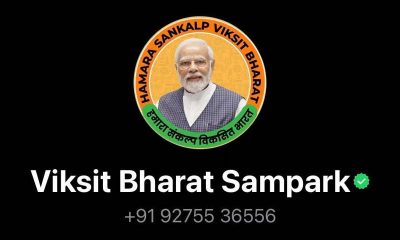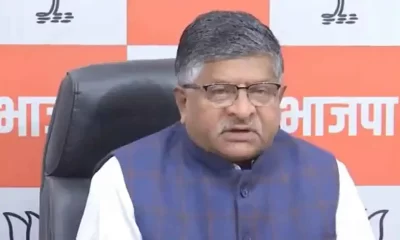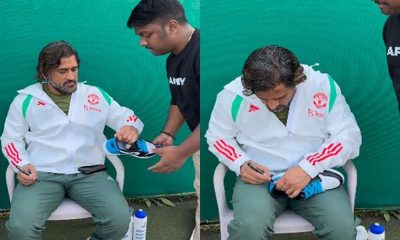India News
Govt asks WhatsApp to set up local entity, grievance system in India

Union information technology minister Ravi Shankar Prasad on Tuesday said WhatsApp has assured the Indian government that it would develop tools to combat the problem of fake messages that cause crimes like mob lynchings.
Prasad had a 45-minute meeting with WhatsApp’s CEO Chris Daniels who is in India on a five-day visit and is expected to meet business and government officials, according to media reports.
Fake messages have taken a toll of more than 20 lives over the last few months. India, with its 200 million users, is WhatsApp’s biggest market and the cases of mob killings — ranging from Assam to Karnataka — have been a huge headache for the company.
Prasad told reporters he had asked WhatsApp to develop a detailed mechanism to trace the origin of any such “sinister” messages, reported Reuters.
“It does not need rocket science to locate a message,” he said, adding that WhatsApp had said it was working with law enforcement agencies to develop its systems.
In the meeting, Prasad told Daniels that the instant messaging firm must comply with Indian laws and set up a corporate presence in the country.
Prasad told Daniels to implement three measures. “You must have a grievance system in India and a whole system where people can reach you immediately. Secondly, you must have proper compliance with Indian laws. We will not appreciate a scenario where any problem that has risen is answered to only in America. Thirdly, WhatsApp having become an important component of India’s digital story must have a proper corporate entity located in India. He assured that the company will soon follow these. He said that we are working with law enforcement agencies to develop a system,” Prasad said he had told Daniels, while briefing reporters.
“I had a very productive meeting. I complimented him for extraordinary technological awakening that WhatsApp has led in the country, for education, healthcare, relief in Kerala. These are positive developments,” he said.
However, Prasad also said that there are “also very sinister developments that provokes crime like mob lynching”, or spread of pornography and the firm “must find solutions to these challenges which are a downright criminal violation of Indian laws”.
Daniels, who arrived in India on Tuesday, will meet business and government officials during his visit to discuss measures being undertaken to counter the issue of fake news on its platform as well as the impending launch of its payments services in the country, reported PTI.
Last month, WhatsApp top executives including COO Matthew Idema had met the IT Secretary and other government officials to outline various steps being taken by the company to tackle fake news in India.
Over the past few months, fake messages circulating on WhatsApp incited incidents of mob fury across parts of India, following which the government sent out two notices to the Facebook-owned company directing it to take urgent measures to curb false information and rumours being spread on the messaging platform.
Subsequently, WhatsApp took steps curb mass message forwards and launched an advertising campaign to educate consumers.
In July, WhatsApp said message forwards will be limited to five chats at a time, whether among individuals or groups, and said it will remove the quick forward button placed next to media messages.
2024 Lok Sabha Elections
PM Modi takes a dig at Rahul Gandhi after Congress picks him for Raebareli, says daro mat, bhago mat
PM Modi, speaking at a Lok Sabha election rally in Bengal, said both Rahul Gandhi and Sonia Gandhi had fled their constituencies.

Prime Minister Narendra Modi today commented for the first time to Congress leader Rahul Gandhi’s announcement of his candidacy for the Raebareli seat. Rahul is making his way towards Raebareli because he is afraid of Amethi seat, according to the PM.
The Prime Minister sneered as he said at a rally in Bengal that today he also want to tell him, Daro Mat (don’t be afraid), Bhaago Mat (don’t run).
Rahul Gandhi has often said, Daro Mat while accusing the BJP government of using investigaticve agencies to terrorise critics and political opponents.
According to Prime Minister Modi, there is no need for an exit poll or opinion survey because Congress would lose by a greater margin than the previous time.
Their tallest leader did not have the guts to fight the polls in Raebareli, Prime Minister Modi added, making reference to Sonia Gandhi. She went away and joined the Rajya Sabha in Rajasthan.
The PM reffered Rahul Gandhi as Shehzaada and said he would lose Wayanad, as he has predicted. He was searching for a second seat because of this. Also, their supporters said that he would battle from Amethi. However, PM Modi said, he is so afraid that he ran to Raebareli to find a way out.
Additionally, he claimed that the I.N.D.I.A bloc is only committed to the voting base of a specific locality.
Speaking out against the TMC and the Left-Congress allience in Bengal, Prime Minister Modi claimed he was not afraid since he had overcome poverty. Getting scared is not in his dictionary. He is determined to work for the country, he said.
Meanwhile, the Amethi-Raebareli decision was attacked by a number of BJP leaders, who claimed it was obvious that Rahul Gandhi knew he couldn’t win Amethi, where Smriti Irani is contesting again following her stunning success in the previous Lok Sabha election.
2024 Lok Sabha Elections
Lok Sabha elections 2024: Rahul Gandhi to contest from Raebareli, KL Sharma from Amethi

The Congress party unveiled its list of candidates on Friday, and the party has picked Rahul Gandhi from Raebareli and Kishori Lal Sharma from Amethi has been nominated. After a great deal of speculation regarding the two Uttar Pradesh seats, the announcement was made.
Raebareli and Amethi have both been strongholds for the Congress. Rahul Gandhi lost against BJP leader and Union Minister Smriti Irani in the 2019 Lok Sabha elections from Amethi.
Taking to social media X, Congress announced their decision to field Rahul Gandhi from Raebareli and KL Sharma from Amethi, which was made at a meeting of the Central Election Committee.
Today is the final day to submit nominations for the fifth phase of the election, which is scheduled to held on May 20th. Both the candidates will file nominations today.
Priyanka Gandhi praised KL Sharma shortly after the nominees for the two prestigious seats were revealed, stating that his loyalty and dedication will help him win the election.
She wrote X, her family has known Kishori Lal Sharma ji for a very long time. His dedication to serving the public good serves as an example. The Congress Party’s decision to nominate Shri Kishori Lal Ji as an Amethi candidate is a matter of joy. She also said Kishori Lal Sharma will undoubtedly win this election because of his devotion to duty and loyalty.
However, given Union minister Smriti Irani’s success in Amethi in 2019, there is worry that Rahul Gandhi’s change of seat could work in the BJP’s favour. With her impending victory, the senior BJP leader has said that the Congress’s delay was due to cold feet and is prepared to defend the seat.
KL Sharma will contest against Smriti Irani in Amethi in the Lok Sabha elections. While, Rahul Gandhi’s opponent would be Dinesh Pratap Singh, who was named by BJP for Raebareli on Thursday. Singh lost the 2019 Lok Sabha elections to former Congress president Sonia Gandhi.
Meanwhile, Rahul Gandhi is scheduled to hold a roadshow in Raebareli after filing of nominations. Congress President Mallikarjun Kharge will also visit Raebareli today.
2024 Lok Sabha Elections
Brij Bhushan Sharan Singh’s son Karan gets BJP Lok Sabha ticket from Kaiserganj
Karan Singh Bhushan was on December 13, 1990. He competed at the national level in double trap shooting. He has a daughter and a son. Karan Singh Bhushan completed his Bachelor of Business Administration (BBA) and law from Dr Ram Manohar Lohia Avadh University.
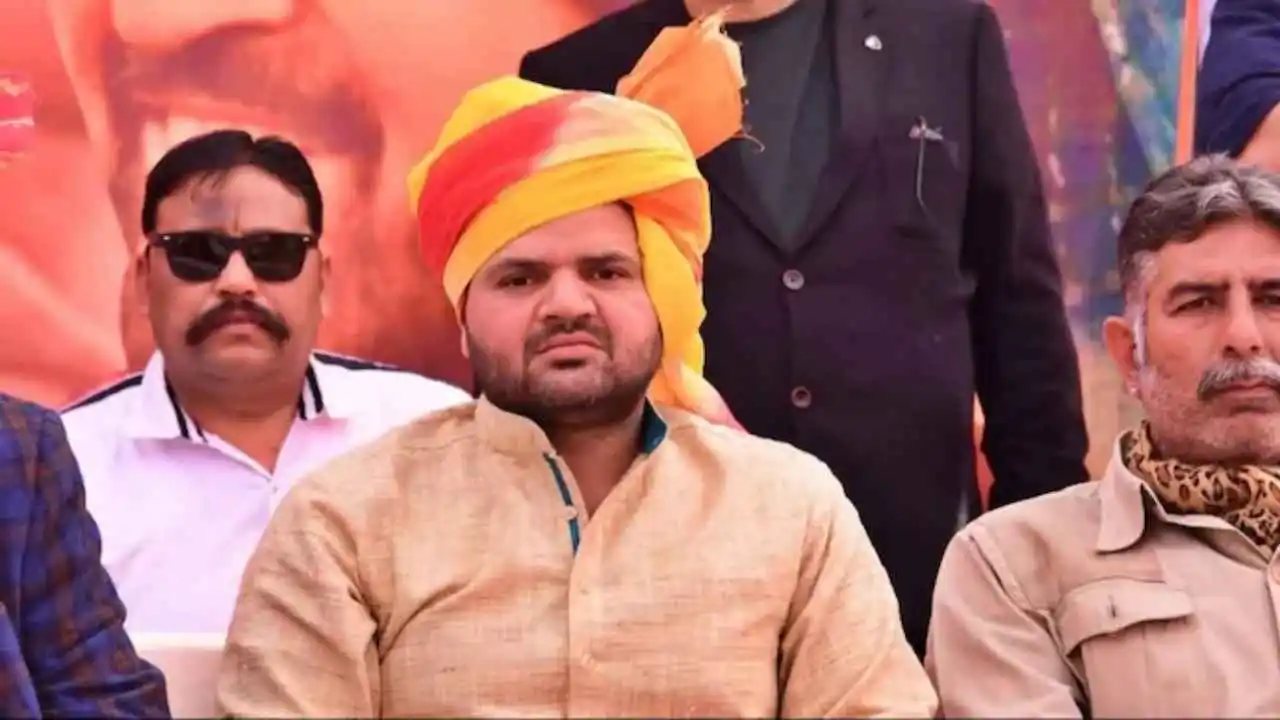
BJP on Thursday dropped sitting Kaiserganj MP Brij Bhushan Sharan Singh, who has been accused of sexual harassment by women wrestlers and gave a ticket to his son, Karan Bhushan Singh. Karan Bhushan, Brij Bhushan’s younger son, is the president of the Uttar Pradesh Wrestling Association. He is also the head of The Cooperative Bank in Nawabganj in Gonda district.
Karan Singh Bhushan was on December 13, 1990. He competed at the national level in double trap shooting. He has a daughter and a son. Karan Singh Bhushan completed his Bachelor of Business Administration (BBA) and law from Dr Ram Manohar Lohia Avadh University.
He has also holds a diploma in business management from Australia. Karan Bhushan Singh is presently the president of the Uttar Pradesh wrestling association. Earlier he was the senior vice president of the UP wrestling association. Elections will be take place in Kaiserganj in the 5th phase of Lok Sabha elections on May 20. Karan Bhushan Singh is likely to file his nomination from Kaiserganj on May 3.
There has been a lot of speculation and suspense on Brij Bhushan Sharan seat this time as the former Wrestling Federation of India (WFI) chief, who is also a 6-term MP, had been accused of sexual harassment by some of the India’s top wrestlers.
Many female wrestlers, including medallists, protested against the BJP leader and demanded his arrest over the charges of sexual harassment while he was serving the position of the WFI president. Wrestlers, including Sakshi Malik and Bajrang Punia, sat on a protest at the Jantar Mantar and demanded action against the Kaiseganj MP.
The Delhi Police later registered a case against Brij Bhushan Sharan Singh under Sections 354 (assault or criminal force to woman with intent to outrage her modesty), 354D (stalking), 354A (sexual harassment) and 506 (criminal intimidation) of the IPC, on June 15, 2023. But he was granted bail on July 20, 2023.
-
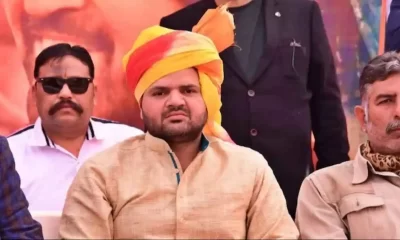
 2024 Lok Sabha Elections21 hours ago
2024 Lok Sabha Elections21 hours agoBrij Bhushan Sharan Singh’s son Karan gets BJP Lok Sabha ticket from Kaiserganj
-
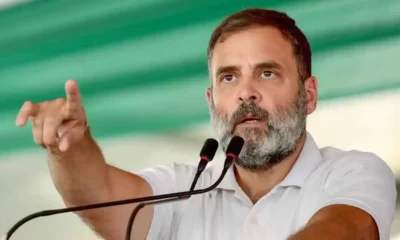
 2024 Lok Sabha Elections22 hours ago
2024 Lok Sabha Elections22 hours agoRahul Gandhi criticises BJP, PM Modi for JD(S) alliance, seeking votes for a mass rapist
-
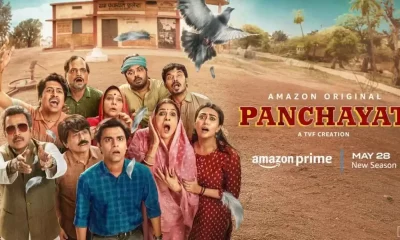
 Entertainment20 hours ago
Entertainment20 hours agoPanchayat Season 3 to premiere on Amazon Prime video on May 28, 2024
-
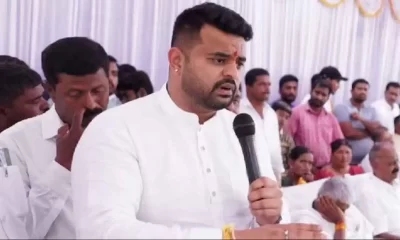
 India News24 hours ago
India News24 hours agoSIT issues lookout notice for Prajwal Revanna in sex video case
-

 2024 Lok Sabha Elections3 hours ago
2024 Lok Sabha Elections3 hours agoLok Sabha elections 2024: Rahul Gandhi to contest from Raebareli, KL Sharma from Amethi
-

 Cricket news2 hours ago
Cricket news2 hours agoRohit Sharma breaks silence on losing MI’s captaincy to Hardik Pandya, says it is part of life
-

 2024 Lok Sabha Elections50 mins ago
2024 Lok Sabha Elections50 mins agoPM Modi takes a dig at Rahul Gandhi after Congress picks him for Raebareli, says daro mat, bhago mat

